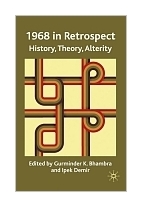|
||
• wydawnictwa polskie
• Zamów informacje o nowościach z wybranego tematu • kontakt
• Cookies na stronie |
1968 IN RETROSPECT: HISTORY THEORY ALTERITYBHAMBRA G.K. DEMIR I.wydawnictwo: PALGRAVE MACMILAN , rok wydania 2009, wydanie Icena netto: What is the meaning of 1968, a year which figures large in the social imaginary? This volume brings together leading social theorists as well as promising younger scholars to examine the phenomenon of '1968' from a number of innovative perspectives, including situating 1968 in global context. The first section includes chapters by leading scholars who were witness to the events, reflecting on untold narratives of race, gender and sexuality as well as weaving their own personal stories into the analysis. The second section critically addresses the standard theoretical concepts and assumptions of 1968. The final section examines 'other voices', examining the struggles of African students, immigrants in France, transgender peoples, and provides a critique of the notion of 'other voices'. The volume also explores if and when 1968 'ended'. GURMINDER K. BHAMBRA is Assistant Professor in the Sociology
Department at the University of Warwick, UK. She is author of Rethinking Modernity:
Postcolonialism and the Sociological Imagination, which won the 2008 Philip Abrams
Memorial Prize for best first book in Sociology, and co-editor (with Robbie Shilliam) of
Silencing Human Rights: Critical Engagements with a Contested Project. Table of Contents Introduction: 1968 in Retrospect; G.K.Bhambra & I.Demir PART I: RETHINKING HISTORICAL NARRATIVES Freedom Now: 1968 as a Turning Point for Black American Student Activism; P.Hill
Collins PART II: THEORETICAL ENGAGEMENTS From 1968 to 1951: How Habermas Turned Marx into Parsons; J.Holmwood PART III: OTHER VOICES May 1968 and the Postcolonial Immigrant in France: Mobilisation, Encounter,
Difference; M.A.Bracke Conclusion: When did 1968 End?; W.Outhwaite 224 pages, Hardcover Księgarnia nie działa. Nie odpowiadamy na pytania i nie realizujemy zamówien. Do odwolania !. |


